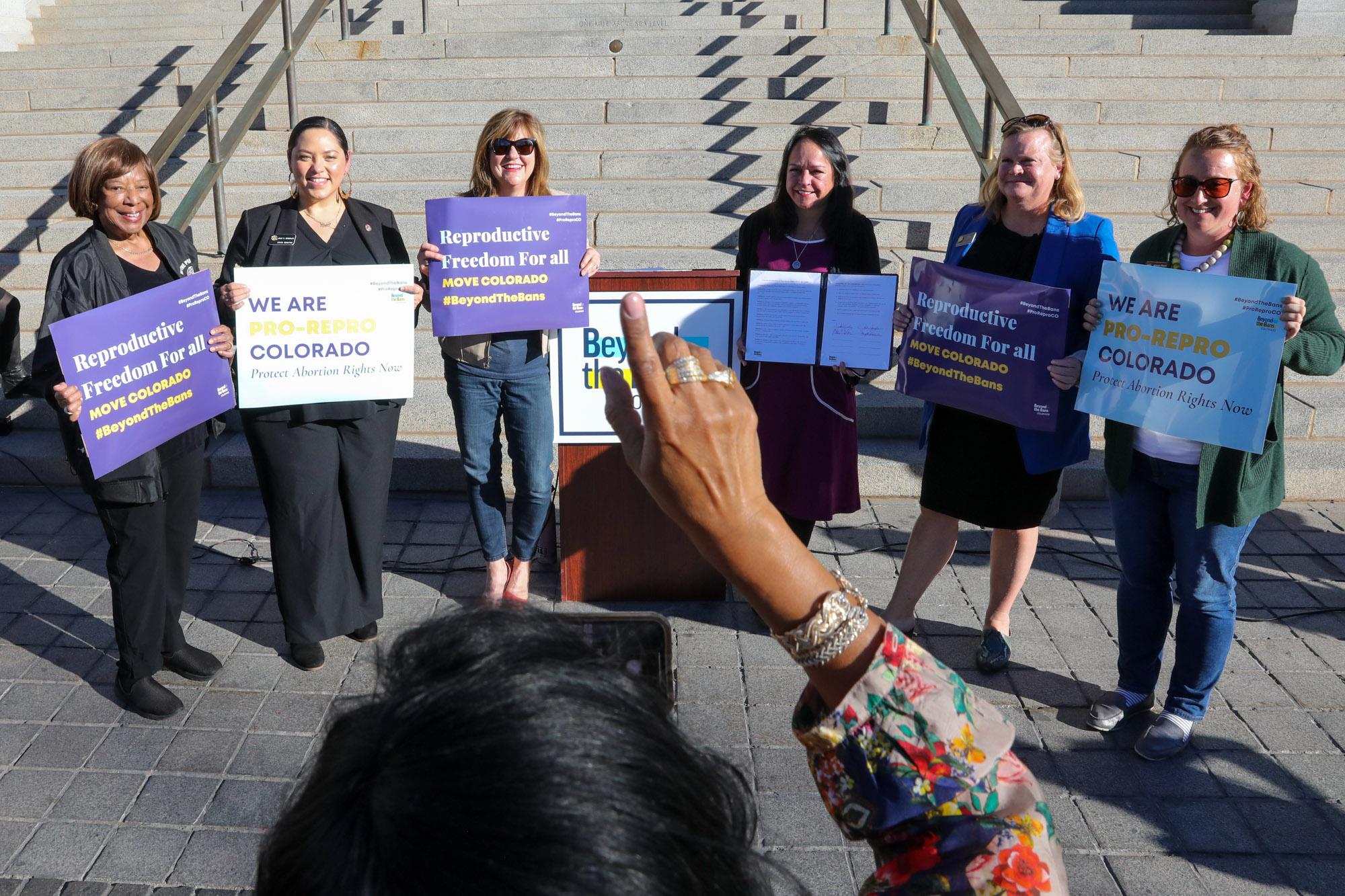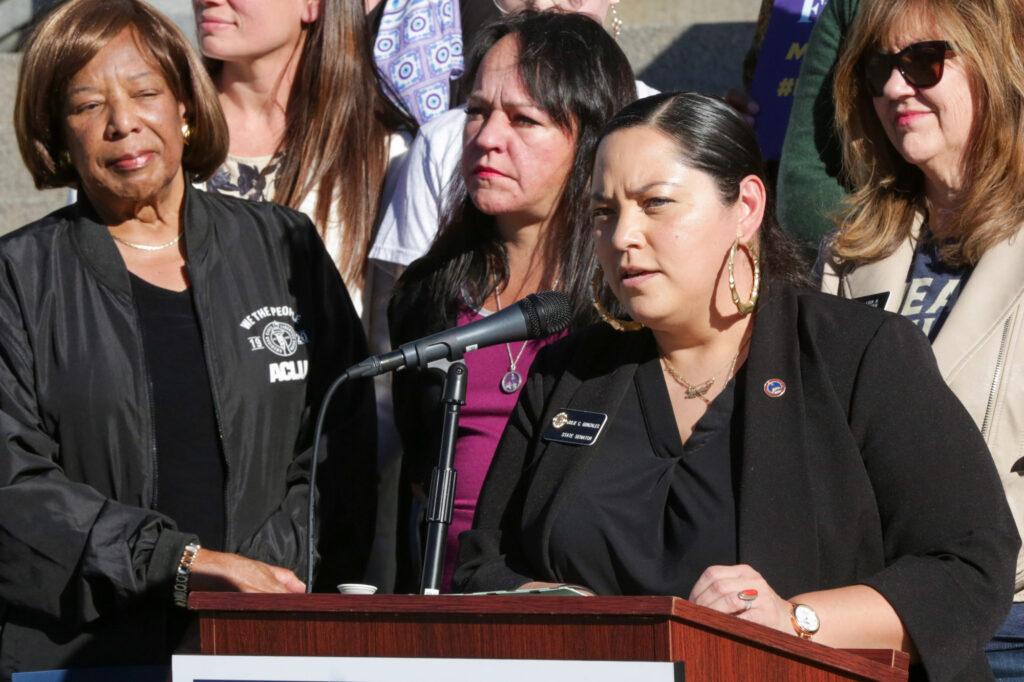
Colorado lawmakers plan to try to enshrine the legality of abortion in state law, given the possibility the U.S Supreme Court could overturn Roe v. Wade in an upcoming ruling.
Advocates for reproductive rights in Colorado said, before now, they didn’t think explicit legal protections were necessary.
“This really shows that we can't rely on the protections of the court, whether it be the Supreme Court of the United States or the Supreme Court of Colorado,” said Democratic state Rep. Meg Froelich, who plans to sponsor the legislation.
“We have to have in statute protections for access to the full range of reproductive care, including abortion.”
Froelich’s bill is still in the conceptual stage, meaning draft language isn’t available, but backers suggested it will go beyond abortion to preserve access to contraception and other types of reproductive health care. House Majority Leader Daneya Esgar and Sen. Julie Gonzales are also working on the bill in conjunction with a number of reproductive and civil rights groups.
The Supreme Court heard arguments Wednesday in Dobbs v. Jackson Women's Health Organization, a major abortion case over the constitutionality of a Mississippi law that bans abortions after 15 weeks of pregnancy.
Colorado voters have overwhelmingly upheld access to abortion in recent elections, most recently voting down a 22-week abortion ban in 2020.
“We've rejected these ballot measures over and over again,” said Froelich. “So we are a state that recognizes that these private decisions should remain private and the people should have access to (abortion).”

Reproductive rights groups held a rally outside the state Capitol Wednesday to announce their work on the bill. Several speakers noted that if the Supreme Court upholds pre-viability limits on abortion, Colorado could become even more of a regional hub for the procedure.
Sen. Gonzales said the bill has been in the works since last summer, when Texas enacted a sweeping, first-of-its kind ban on abortions after six weeks.
“I heard from constituents who were asking me then, ‘I see what’s happening in Texas and I want to know, what is Colorado going to do?’” Gonzales said.
However, Republican state Rep. Matt Soper said Democrats are getting ahead of themselves by trying to change the law before the Supreme Court rules on Dobbs.
"I don’t think it’s wise for any state to be making laws until the U.S Supreme Court has made a decision, just because the Court is the highest court in the land," said Soper. "This is our system and I want to know what the Supreme Court is going to decide."
But for abortion access supporters in Colorado, Wednesday's oral arguments were the fulfillment of fears they’ve held for years as the court’s membership has grown more conservative.
“People were saying, ‘Roe will never be overturned, never say never,’” said Karen Middleton, the executive director of COBALT, a non-profit that works on abortion access and reproductive rights. “I think there was real disbelief that we could get to where we are today, but we’re here.”
Rep. Froelich said the abortion rights bill will be introduced in the early part of the legislative session, which begins Jan. 12. Democrats have healthy majorities in both the House and the Senate.
Colorado’s attorney general, Phil Weiser, also joined dozens of other attorneys general in briefs urging the Supreme Court to uphold abortion rights.
“We are aware that we might be facing a new frontier. It is a scary frontier,” he said in an interview. “The first and fundamental step we're taking is making sure that people of Colorado know that we're committed to protecting reproductive rights.”
What overturning Roe could mean for Colorado
Richard Collins, a professor of constitutional law at CU Boulder, said that the outcome of Dobbs vs Jackson Women’s Health Organization would not have an immediate legal effect in Colorado, even without a new state law.
“We don’t have any laws criminalizing abortion,” he said. “In fact, we were one of the very first states to remove such laws.”
Colorado decriminalized abortion in limited circumstances in 1967, the first state to do so.
But while the state doesn’t have any significant legal limits on abortion, its current laws also don’t expressly state that people have a right to get an abortion.
That means if Roe v. Wade is undermined or overturned, it would open the door for abortion opponents to introduce more attempts to limit the procedure. Twenty-two states already have laws on the books that would mostly or entirely outlaw the procedure if Roe is overturned.
Collins said that a state law protecting abortion could also discourage individual cities and counties in Colorado from creating local bans on abortion.
“There will be efforts here by abortion opponents to get such laws passed,” he predicted. “Yes, abortion would remain accessible in Colorado, but … there’s nothing explicitly protecting it, and I would assume that anti-abortion folks would try and introduce something that would make it illegal.”
Indeed, Republican lawmakers have introduced abortion bans in recent sessions. However, even some GOP members who would like to see abortion outlawed in Colorado acknowledge it’s unlikely to happen.
Rep. Shane Sandridge is an El Paso County Republican who has introduced bills on the topic. On Wednesday, he said he hoped that the Supreme Court would allow the states to choose whether they limit abortions. But he said there was little chance Colorado voters would support new abortion restrictions here.
“Obviously the population as a whole doesn't look at abortion like I do in Colorado,” he said. “I don't think it's really gonna change anything.”
And without any likelihood of abortion restrictions making it into law, Sandridge contended that the Democrats’ proposed bill was “pandering.”
“It's show — because either way, people are still going to be able to get their abortions,” he said.
However, this week’s Supreme Court arguments did energize abortion opponents in the state.
At a rally hosted by Colorado Christian University, Biff Gore, president of Colorado Right to Life, said, “We are not people of despair and we should never lose heart, because as long as we have life in our bodies and resources in our pockets, we need to fight.”
“And we need to be encouraging our children, and our children’s children to take over at the Capitol.”
The Supreme Court is expected to rule on the Mississippi Case this June or July.









